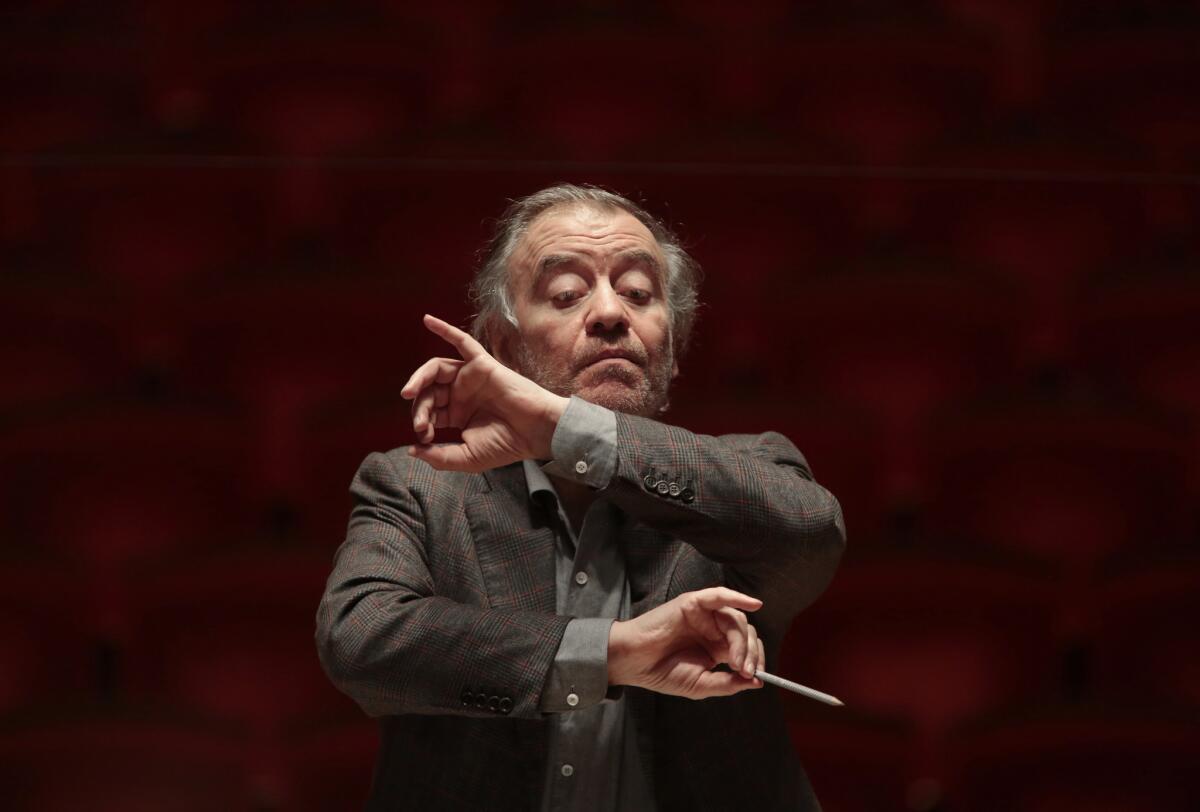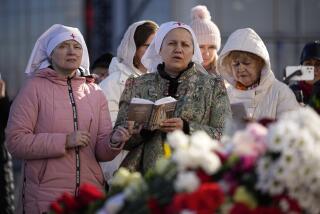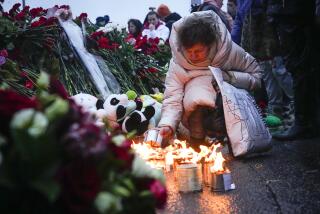Valery Gergiev wants to make music, but the West brings up Putin

Leaving the Metropolitan Opera recently after hearing Valery Gergiev conduct Tchaikovsky’s “Iolanta” and Bartók’s “Bluebeard’s Castle,” I walked past a handful of shivering Ukrainian activists standing in the frigid cold on the sidewalk. They waved banners reading “GERGIEV supports WAR in UKRAINE” and “DON’T PLAY PUTIN’S TUNE.”
The most prominent Russian artist of our time, Gergiev has also become the most controversial because of his support for Vladimir Putin’s policies in Ukraine and Crimea.
Gergiev has tried to brush off his long-standing friendship with the Russian president, which has led to a few soloists no longer wanting to perform with the conductor and a festival in Saarbrücken, Germany, blackballing him. Gergiev, however, has insisted that he is a busy musician with no time for politics.
The morning after the opera I spent an hour with Gergiev, who has mostly avoided Western media, to get his side. He agreed as long as he would be allowed to put politics in the larger perspective of his musical priorities.
He is busy. In Russia, he heads the Mariinsky Theatre in St. Petersburg along with the White Nights and Russian Easter festivals and the International Tchaikovsky Competition. Elsewhere, Gergiev is concluding his tenure as music director of the London Symphony Orchestra and moving to the Munich Philharmonic. He has yet more festivals — in Finland, Sweden, Holland, Israel and China — and maintains a punishing guest-conducting schedule.
Sign up to receive our Essential Arts & Culture Newsletter
Last week, he finished a month in the U.S., which included opera, ballet and orchestral performances with the Mariinsky in New York, Florida and Michigan as well as guest conducting at the Metropolitan Opera.
Wherever he went he was greeted by protesters, including one who managed to reach the stage of the Met with a banner when Russian soprano Anna Netrebko, who starred in “Iolanta” and who has also been a vocal Putin supporter, was taking her curtain call.
Although Gergiev says he is not concerned with protesters expressing their opinions outside, he won’t tolerate that in the theater.
“People come to hear music,” he says, “not to hear shouting. And to go on stage and scare Netrebko, how can the Met let this happen? If someone were to shout an anti-American slogan on the stage of the Mariinsky, it would be my fault.”
The morning we met, he had an early appointment across town and then had to be in Philadelphia by noon, where he was rehearsing the Philadelphia Orchestra.
He squeezed me in on the crosstown drive. We continued our conversation — Gergiev speaks fluent English — once the driver parked, with Gergiev waving off his assistant until the maestro was finally dragged away. He is never on time.
I met him in 1990, when Gergiev had just turned 37 and was in his second season as artistic director of the then Kirov (the Mariinsky’s Soviet name still then in use). His appointment had been a surprising and daring choice; at the time Gergiev was an obscure assistant conductor of the company.
But he had a grand vision. The Soviet system had just ended, and the new director was obsessed with an extensive reevaluation of Russian culture.
FULL COVERAGE: Inside the Los Angeles Philharmonic
He had begun a zealous investigation of operas by Prokofiev, Shostakovich, Mussorgsky, Rimsky Korsakov and Tchaikovsky that had fallen out of the repertory during the Soviet era. Russia, he said at the time, needed to know itself to become a meaningful new nation. He also intended, in the process, to restore the Kirov to its former glory.
Gergiev accomplished all that and much more, including building a concert hall for the Mariinsky Orchestra and a second opera house. He became an international ambassador for Russian culture. He had help.
“All the major cultural institutions in Russia need state support,” Gergiev explained as we drove past glitzy, unashamedly commercial Times Square. And that, he pointed out, includes the Hermitage, the Bolshoi and the Pushkin Museum. In St. Petersburg, he found his first ally in the city government from a culturally proactive assistant mayor: Vladimir Putin.
Putin is the rare world leader willing to associate himself and his office with the arts. He basks in the glory of Russian culture. When heads of state visit, he invariably takes them to the ballet and the Hermitage, something an American president or British prime minister wouldn’t dare do for fear of appearing elitist. Gergiev recalls meeting George W. Bush at a ballet performance he conducted at the Mariinsky.
The relationship between Gergiev and Putin is clearly symbiotic. The $700-million second Mariinsky opera house, which opened two years ago and turned the opera company into the world’s largest, would hardly have been possible without Putin’s backing.
But Gergiev hastens to add that previous administrations had funded the Mariinsky, and he expects future ones to as well. What he says he really needs from Putin are policies that promote a strong economy so that state support will be easier to obtain.
The other side of the Russian cultural equation for Gergiev is that culture needs to be as thoroughly ingrained as possible. His model was Russia’s most revered conductor, Yvgeny Mravinsky, who was music director of the Leningrad Symphony for 50 years up to his death in 1988. Gergiev credits Mravinsky with teaching him the importance of maintaining a tradition rooted in history.
“Of course, I was conscious that the Kirov was a gold mine when I was appointed director,” he says, “but you have to continue to build it to maintain a high quality and a national tradition.”
Looking around the world Gergiev had noticed that the Paris Opera, the Vienna State Opera and La Scala had all lost their national character in the 1970s. So he concentrated on first making the Mariinsky maybe the country’s most imposing monument to Russian culture and only later turning to the great Verdi and Wagner operas that had also fallen out of the company’s repertory.
For Gergiev this emphasis on tradition was also a reminder of what he calls the humanistic role of art. Russia in the post-Soviet era, he notes, needed then “as many leaders as possible to bring it back to normal.”
One thing that had fallen out of normality was the environment. In the early ‘90s, Gergiev started a small festival in Mikkeli, Finland, where he could try out new repertory out of the limelight. And what he discovered in Finnish forests were lakes where the water is clean enough to drink.
“It was unthinkable in Russia that any lake be full of drinkable water,” he marvels, “or trees be healthy or the air clean.
“It was a learning process, of course,” Gergiev continues. His main environmental mentor became his conductor-composer friend Esa-Pekka Salonen. Together they started the Baltic Sea Festival in Stockholm to promote environmental issues, and Gergiev eventually became one of his country’s first prominent figures to promote environmental reform.
Gergiev contends that it is an artist’s responsibility to provide humanitarian support whenever possible. He led a benefit concert in Tokyo to raise money for victims of the Fukushima earthquake, and he has appeared at other hot spots in Russia and around the world.
“I do it without any contract,” Gergiev explains. “There is no way to make a contract when you want to react to something that happened two days ago. I did that in the Beslan school bombing in the south of Russia,” when Islamic terrorists seized the school in 2004 and 318 hostages died, including 186 children.
“Why?” Gergiev asks. “Because humanistic concerns are the key to understanding what today are my bigger worries. And that includes Ukraine.”
International anger toward Gergiev has been building in direct proportion to Putin’s growing unpopularity in Europe and the U.S. An ethnic Ossetian, Gergiev organized a controversial concert in tribute to the South Ossetian victims he accused Georgia of slaughtering in the 2008 war with Russia.
Two years ago he said he initially approved of Putin-backed anti-gay legislation, thinking it was designed only to protect children from sexual predators. No one has accused Gergiev of being homophobic, and the Mariinsky has a history of tolerance, especially under Gergiev, but the incident unleashed a torrent of negative publicity and tarnished the conductor’s reputation. The Munich Philharmonic had second thoughts about his appointment, which he eventually overcame.
His approval of the Russian annexation of Crimea was for some the last straw. Gergiev says he sees the situations in Crimea and Ossetia both as cases of Russia coming to the rescue, especially with the South Ossetians accusing the Georgians of genocide.
In Ukraine, Gergiev worries about the Russian-speaking population being made second-class citizens by the nationalists now in power. “What happens then?” he asks. “The whole thing became dangerous 11 months ago, and now it’s deadly.
“It’s a long story,” he says, explaining that people outside of the region have trouble appreciating how deep-rooted the issues are. For this, Gergiev says you have to go back to the history of Ukraine and its relationship to Russian culture.
“The Crimea issue is not something from five years ago or three years ago. You have to go back 200 years, 100 years and especially to the years of Nazi Germany. This is the key.”
For Gergiev, the shadow of World War II remains a painfully divisive factor in Ukrainian society. When the Nazis invaded, the majority of Ukrainians fought on the side of the Allies, but some joined the National Socialists.
“Can you forget totally?” Gergiev asks.
The current conflict has “inflamed emotions which had been kind of sleeping for 70 years,” he says, especially if Ukrainian Russians perceive evidence of neo-Nazism among the nationalists and feel persecuted when their language is no longer dominant.
Gergiev sees himself in a position to view Ukraine from inside Russia and, because of his time spent performing outside of Russia, from without.
Yet he also may have a rare perspective as someone who lives in the world of opera, an art form where emotions, often based on historical prejudice, come to the fore to cause no end of tragedy. This is ultimately what he says he wants to see avoided.
Along with the majority of Russians, Gergiev views the conflict in Ukraine as a struggle for the national soul. Some of Russia’s most iconic artists were from Eastern Ukraine, where the fighting has been most intense. Donetsk is the birthplace of Prokofiev, Gergiev’s favorite composer.
Gergiev goes on to note that beyond his association with Putin, he has come in contact with kings and queens and presidents and prime ministers throughout his career and has been friends with some before anyone knew who Putin was. But as a conductor, music is his concern.
“I’ve met all the presidents of China,” he says slightly dismissively. “Does it change my music? No.”
But he is now demanding politicians take the high road and get beyond assigning blame to find a solution for Ukraine. “The responsibility lies in the hands of the leaders in Russia, the U.S. and Europe,” Gergiev says.
“These people have to now decide what it takes to stop the fighting. If they do not, all of them will go down in history as the people who did not find an answer.
“They will never be forgiven. Never!”
More to Read
The biggest entertainment stories
Get our big stories about Hollywood, film, television, music, arts, culture and more right in your inbox as soon as they publish.
You may occasionally receive promotional content from the Los Angeles Times.







